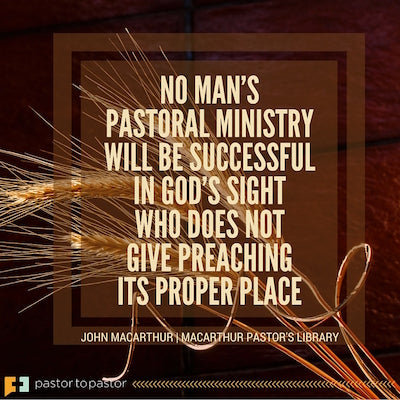 As he neared the end of his life, the veteran pastor Paul addressed this exhortation to his young prote ́ge ́ Timothy:
As he neared the end of his life, the veteran pastor Paul addressed this exhortation to his young prote ́ge ́ Timothy:
I solemnly charge you in the presence of God and of Christ Jesus, who is to judge the living and the dead, and by His appearing and His kingdom: preach the word; be ready in season and out of season; reprove, rebuke, exhort, with great patience and instruction. For the time will come when they will not endure sound doctrine; but wanting to have their ears tickled, they will accumulate for themselves teachers in accordance to their own desires; and will turn away their ears from the truth, and will turn aside to myths (2 Tim. 4:1–4).
In those words, which may be the last Timothy ever received from his beloved mentor, Paul set forth the pastor’s highest priority. While the duties of the pastorate are many and varied, as the other chapters in this section on ‘‘Pastoral Perspectives’’ indicate, none is more important than preaching. Charles Jefferson perceptively noted:
Pastoral work is not simply making social calls; pastoral work is also preaching. The minister does not cease to be a pastor when he goes into the pulpit; he then takes up one of the minister’s most exacting and serious tasks. We sometimes hear it said of a minister: ‘‘He is a good pastor, but he cannot preach.’’ The sentence is self-contradictory. No man can be a good pastor who cannot preach, any more than a man can be a good shepherd and still fail to feed his flock. A part of shepherding is feeding, and an indispensable part. Some of the finest and most effective of all a minister’s pastoral work is done in his sermon. In a sermon he can warn, protect, guide, heal, rescue, and nourish. The shepherd in him comes to lofty stature in the pulpit. . . . A shepherd who is skilled in his work never fails to feed his flock.2
Paul did not wait until the end of his life to stress the importance of preaching to Timothy; it had been a constant theme in his letters to the young pastor. In 1 Timothy 4:11 he instructed Timothy to ‘‘prescribe and teach these things.’’ He further commanded Timothy,
Until I come, give attention to the public reading of Scripture, to exhortation and teaching. Do not neglect the spiritual gift within you, which was bestowed upon you through prophetic utterance with the laying on of hands by the presbytery. . . . Pay close attention to yourself and to your teaching; persevere in these things; for as you do this you will insure salvation both for yourself and for those who hear you (1 Tim. 4:13–14, 16).
In 1 Timothy 5:17 Paul ordered that ‘‘the elders who rule well be considered worthy of double honor, especially those who work hard at preaching and teaching.’’ After giving him instructions about relations between Christian masters and slaves, Paul told Timothy to ‘‘teach and preach these principles’’ (6:2). What Timothy had ‘‘heard from
in the presence of many witnesses,’’ he was to ‘‘entrust to faithful men, who
Nor was this emphasis on preaching unique to Paul; it runs throughout the New Testament. In Luke 4:43 the Lord Jesus Christ revealed the important place preaching held in His earthly ministry when He said, ‘‘I must preach the kingdom of God to the other cities also, for I was sent for this purpose.’’ Indeed, His earthly ministry was largely one of preaching and teaching (for example, Matt. 4:17; 11:1; Mark 1:14, 38–39; Luke 8:1; 20:1). He left His church with the charge, ‘‘Go into all the world and preach’’ (Mark 16:15).
Preaching was also central to the early church’s ministry, as even a cursory reading of Acts indicates. Immediately after the church came into being on the Day of Pentecost, Peter preached and three thousand were converted (Acts 2:14–41). Shortly afterward, Peter preached another major sermon from Solomon’s portico in the temple (Acts 3:11–26). The preaching of Philip (8:5, 12, 35, 40), Paul (9:20; 13:5, 16–41; 14:7, 15, 21; 15:35; 16:10; 17:13; 20:25; 28:31), the apostles (4:2; 5:42), and others in the church (8:4; 11:20) is also a prominent feature in Acts.
The true church throughout its history has strongly emphasized biblical preaching. Preaching held a central place in the Reformation of the sixteenth century, the Puritan revival of seventeenth-century England, and the Great Awakening of the eighteenth century. The nineteenth-century church countered the rising tide of apostasy and modernity with the powerful preaching of men such as Charles Spurgeon, Joseph Parker, Alexander Maclaren, and Alexander Whyte.
The words of Paul in 1 Corinthians 1:17–25 best sum up the priority of preaching:
For Christ did not send me to baptize, but to preach the gospel, not in cleverness of speech, that the cross of Christ should not be made void. For the word of the cross is to those who are perishing foolishness, but to us who are being saved it is the power of God. For it is written, ‘‘I will destroy the wisdom of the wise, and the cleverness of the clever I will set aside.’’ Where is the wise man? Where is the scribe? Where is the debater of this age? Has not God made foolish the wisdom of the world? For since in the wisdom of God the world through its wisdom did not come to know God, God was well-pleased through the foolish- ness of the message preached to save those who believe. For indeed Jews ask for signs, and Greeks search for wisdom; but we preach Christ crucified, to Jews a stumbling block, and to Gentiles foolishness, but to those who are the called, both Jews and Greeks, Christ the power of God and the wisdom of God. Because the foolishness of God is wiser than men, and the weakness of God is stronger than men.
No man’s pastoral ministry will be successful in God’s sight who does not give preaching its proper place.
-John MacArthur, MacArthur’s Pastor’s Library
How to Use This Book
This collection from bestselling author John MacArthur encourages those called to ministry with insightful and challenging advice on how to best serve a congregation and commission others to extend the kingdom of God. Written by MacArthur and his colleagues at The Master’s Seminary, the MacArthur’s Pastor’s Library presents a practical and proactive guide for a new generation of shepherds.

